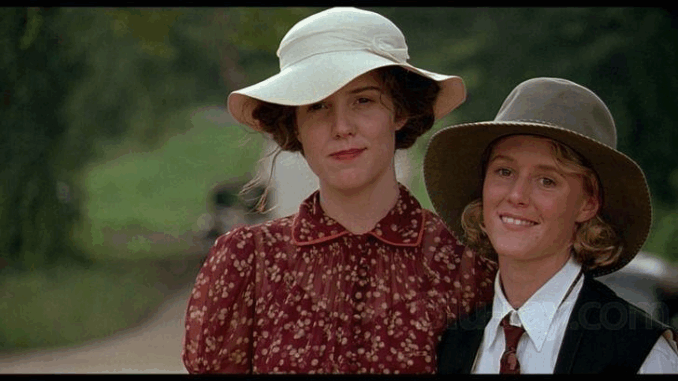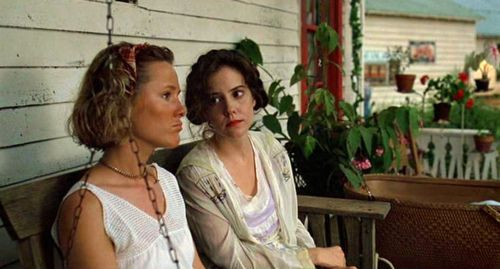
Few movie characters have left as lasting an impression as Ruth Jamison in Fried Green Tomatoes (1991). Played with quiet power and grace by Mary-Louise Parker, Ruth stands as one of cinema’s most enduring portrayals of love, resilience, and redemption.
In a story filled with complex relationships and deep emotions, Ruth’s journey from fragility to fierce inner strength continues to resonate with audiences worldwide. Her character isn’t just a reflection of southern gentility—it’s a testament to the human capacity for courage, forgiveness, and transformation.
Let’s take a closer look at who Ruth Jamison truly was—and why her story continues to inspire generations.
Who Was Ruth Jamison?
Ruth Jamison enters Fried Green Tomatoes as a soft-spoken, seemingly delicate woman. She’s kind, polite, and deeply rooted in her faith. But beneath that gentle demeanor lies a woman carrying heavy burdens—an abusive marriage, personal loss, and the struggle to find her own identity.
When she meets Idgie Threadgoode (played by Mary Stuart Masterson), everything changes. Their friendship becomes the cornerstone of both women’s lives, transforming Ruth from a victim of circumstance into a symbol of strength and redemption.
Ruth Jamison’s Introduction: A Fragile Soul in a Harsh World
Ruth first appears as a Sunday school teacher, a proper woman molded by the expectations of Southern society. She’s gentle to a fault, almost too careful, the kind of person who apologizes even when she’s done nothing wrong.
But it doesn’t take long to see that her fragility isn’t weakness—it’s survival. Ruth is trapped in a life that suffocates her spirit, and her journey begins when she finds the courage to break free.

The Turning Point: Ruth’s Escape from Abuse
One of the most powerful and emotional arcs in Fried Green Tomatoes is Ruth’s escape from her abusive husband, Frank Bennett. Frank represents the cruel control of patriarchy and fear—he’s everything Ruth is not.
When Ruth finally decides to leave him, it’s not just an act of self-preservation—it’s an act of rebirth. And it’s Idgie Threadgoode who helps her take that first step toward freedom.
In a time when women had few options and even fewer rights, Ruth’s decision to walk away from her abuser was radical. It was the moment she took her life back.
Idgie and Ruth: A Love That Transcends Labels
The relationship between Idgie and Ruth is the emotional heart of Fried Green Tomatoes. Whether you interpret it as deep friendship or romantic love, their bond is undeniable.
Their connection is built on mutual respect, trust, and an unspoken understanding of one another’s pain. Idgie’s wild, rebellious spirit complements Ruth’s quiet grace, creating a perfect balance of chaos and calm.
In each other, they find what the world denied them—freedom, acceptance, and unconditional love.
The Whistle Stop Café: A New Beginning
Together, Ruth and Idgie open The Whistle Stop Café, a haven for their community and a symbol of second chances. The café becomes more than a business—it’s a sanctuary.
Here, Ruth isn’t defined by her past or her trauma. She’s not “the woman who left her husband.” She’s a leader, a cook, and a nurturer. Through the café, Ruth reclaims her power, proving that healing is possible even after deep pain.
Ruth as a Symbol of Strength
Ruth Jamison embodies a quiet, enduring strength that differs from Idgie’s fiery defiance. While Idgie fights the world head-on, Ruth’s power lies in her patience, faith, and resilience.
She represents a different kind of courage—the courage to forgive, to love again, and to keep going when everything inside you wants to stop. Ruth’s gentleness isn’t weakness; it’s a weapon cloaked in kindness.
The Depth of Ruth’s Love
Ruth’s love isn’t loud or dramatic. It’s steady, unwavering, and deeply selfless. She loves Idgie not just for who she is, but for how Idgie helps her rediscover herself.
Her love is the kind that heals—the kind that rebuilds broken people. Through Ruth, the film reminds us that love, when pure, can be the greatest form of redemption.
Motherhood and Loss: Ruth’s Most Painful Trial
After Ruth gives birth to her son, Buddy Jr., she faces both joy and heartbreak. Her love for her child gives her purpose, but her battle with illness cuts that happiness short.
Ruth’s death is one of the most devastating moments in Fried Green Tomatoes. Yet even in her final days, she radiates grace and peace. Her life, though brief, leaves behind an eternal mark of compassion and strength.
The Trial and the Town’s Loyalty
When Frank Bennett mysteriously disappears, suspicion falls on Idgie and Ruth. The trial that follows isn’t just about guilt or innocence—it’s about loyalty and love.
The entire town stands behind them, reflecting the deep bonds they built through kindness and community. Ruth’s quiet integrity becomes her defense, and Idgie’s fierce protection proves the depth of their connection.
It’s a powerful statement about solidarity and the human instinct to defend what’s right.
Ruth Jamison’s Faith and Moral Compass
Faith is a central pillar in Ruth’s life. Even when everything falls apart, she holds on to her belief in goodness. But her faith isn’t blind—it evolves.
She learns that love and morality can exist outside rigid social norms. Her spirituality becomes a source of empowerment rather than submission, guiding her toward self-respect and forgiveness.
Redemption Through Love and Forgiveness
Ruth’s story is one of redemption. She doesn’t seek revenge against Frank or bitterness toward her pain. Instead, she chooses love—love for Idgie, for her son, and for herself.
Her ability to forgive, even in the face of cruelty, is what makes her redemption so powerful. She teaches us that healing doesn’t come from forgetting the past—it comes from making peace with it.
Mary-Louise Parker’s Brilliant Portrayal
Mary-Louise Parker’s performance as Ruth Jamison is a masterclass in emotional nuance. She captures Ruth’s fragility, warmth, and quiet fire with breathtaking precision.
Parker’s portrayal elevates Ruth from a supporting role to the emotional soul of the film. Every glance, every tear, every smile feels authentic—making Ruth unforgettable.
The Legacy of Ruth Jamison
Decades after the film’s release, Ruth Jamison remains a cultural icon. She represents the universal struggle for freedom, identity, and self-worth.
Her character continues to inspire anyone who’s ever had to rebuild after loss, stand up against abuse, or find love in unexpected places. Ruth reminds us that gentleness and strength can coexist—and that true power often wears a quiet face.
Why Audiences Still Love Ruth Jamison
Ruth’s story speaks to something deep within us all: the desire to be seen, loved, and accepted for who we truly are.
Her courage to break free, her faith in love, and her redemption through kindness make her one of cinema’s most human and relatable figures. She’s not perfect—but that’s exactly why we love her.
Conclusion: Ruth Jamison — A Beacon of Hope and Humanity
In Fried Green Tomatoes, Ruth Jamison isn’t just a character—she’s a symbol. A symbol of grace under pressure, love that heals, and redemption that transcends pain.
Her story reminds us that no matter how broken we are, we can always rebuild. We can always forgive. And we can always find light again—even in the darkest moments.
Ruth’s legacy is proof that strength doesn’t have to roar—it can whisper, and still change lives forever.
FAQs
1. Who played Ruth Jamison in Fried Green Tomatoes (1991)?
Ruth Jamison was portrayed by the talented actress Mary-Louise Parker, whose performance brought emotional depth and authenticity to the role.
2. What was Ruth Jamison’s relationship with Idgie Threadgoode?
Their relationship was a deep and powerful bond that transcended friendship—marked by loyalty, love, and mutual respect.
3. What does Ruth symbolize in Fried Green Tomatoes?
Ruth represents strength, forgiveness, and redemption through love and compassion.
4. How does Ruth’s character change throughout the movie?
Ruth evolves from a submissive, fearful woman into an independent, empowered figure who finds peace and purpose through love and faith.
5. Why is Ruth Jamison’s story still relevant today?
Her journey speaks to universal themes of survival, empowerment, and the healing power of love—making her story timeless and deeply human.
